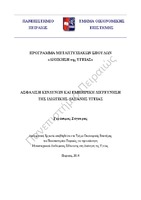Ασφάλιση κινδύνων και εμπειρική διερεύνηση της ιδιωτικής δαπάνης υγείας.
Risk insurance and empirical investigation of the private health expenditure

Προβολή/
Θεματική επικεφαλίδα
Ασφάλιση ; Κίνδυνος (Ασφάλεια)Περίληψη
Ο κίνδυνος αποτελεί αναπόσπαστο μέρος της καθημερινής ζωής των ατόμων και των επιχειρήσεων και δεν υπόκειται στον έλεγχο της δυνάμεως, της σκέψεως ή της θελήσεως του ανθρώπου. Η ασφάλιση αποτελεί τον αποτελεσματικότερο τρόπο αντιμετώπισης του κινδύνου. Στα πλαίσια αυτής της εργασίας, γίνεται μια προσπάθεια παρουσίασης του θεσμού της ιδιωτικής ασφάλισης, της σημασίας της στη σύγχρονη κοινωνία, τις οδηγίες φερεγγυότητας (Solvency I και II) και του τρόπου με τον οποίο επηρεάζονται οι ιδιωτικές δαπάνες υγείας.
Στη θεωρητική επισκόπηση του θέματος (κεφάλαια ένα έως τέσσερα), γίνεται μια παρουσίαση των βασικών στοιχείων του κινδύνου, των εναλλακτικών μεθόδων αντιμετώπισης και διαχείρισης των κινδύνων, της έννοιας και των κύριων χαρακτηριστικών της ιδιωτικής ασφάλισης καθώς και της συμβολής της σε οικονομικό και κοινωνικό επίπεδο. Ακολουθεί μια παρουσίαση της φυσιογνωμίας και του μεγέθους της ελληνικής ασφαλιστικής αγοράς και η σύγκρισή της με τα αντίστοιχα μεγέθη στην Ευρώπη. Στη συνέχεια, αναλύονται οι βασικές νομικές αρχές που διέπουν την ιδιωτική ασφάλιση και οι λόγοι που υπαγορεύουν την κρατική εποπτεία, δίνοντας ιδιαίτερη έμφαση στη νομοθεσία που σχετίζεται με τη φερεγγυότητα των ασφαλιστικών εταιρειών και κυρίως το Solvency II, τη νέα κοινοτική οδηγία που αντικατοπτρίζει τις πιο πρόσφατες εξελίξεις στην εποπτεία, την αναλογιστική επιστήμη και τη διαχείριση κινδύνων.
Στο ερευνητικό μέρος της εργασίας (κεφάλαιο τέσσερα) γίνεται, με τη χρήση δεδομένων που συλλέχθηκαν από τη βάση δεδομένων του ΟΟΣΑ, μια εμπειρική μελέτη του τρόπου με τον οποίο επηρεάζονται οι συνολικές δαπάνες υγείας (ως ποσοστό του ΑΕΠ) που χρηματοδοτούνται από ιδιωτικές δαπάνες, από τον αριθμό των γενικών γιατρών (ανά 1.000 κατοίκους), τον αριθμό των ειδικών γιατρών (ανά 1.000 κατοίκους), τον αριθμό των νοσοκομείων (ανά 1.000 κατοίκους) και τον συνολικό αριθμό κλινών (ανά 1.000 κατοίκους).


